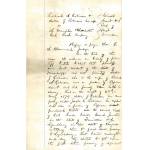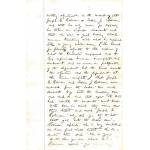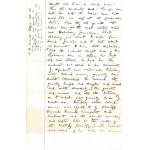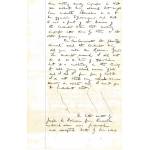Testimony from Robinson v. Memphis and Charleston Railroad Company
ca. 1879
Add to Favorites:
Add all page(s) of this document to activity:
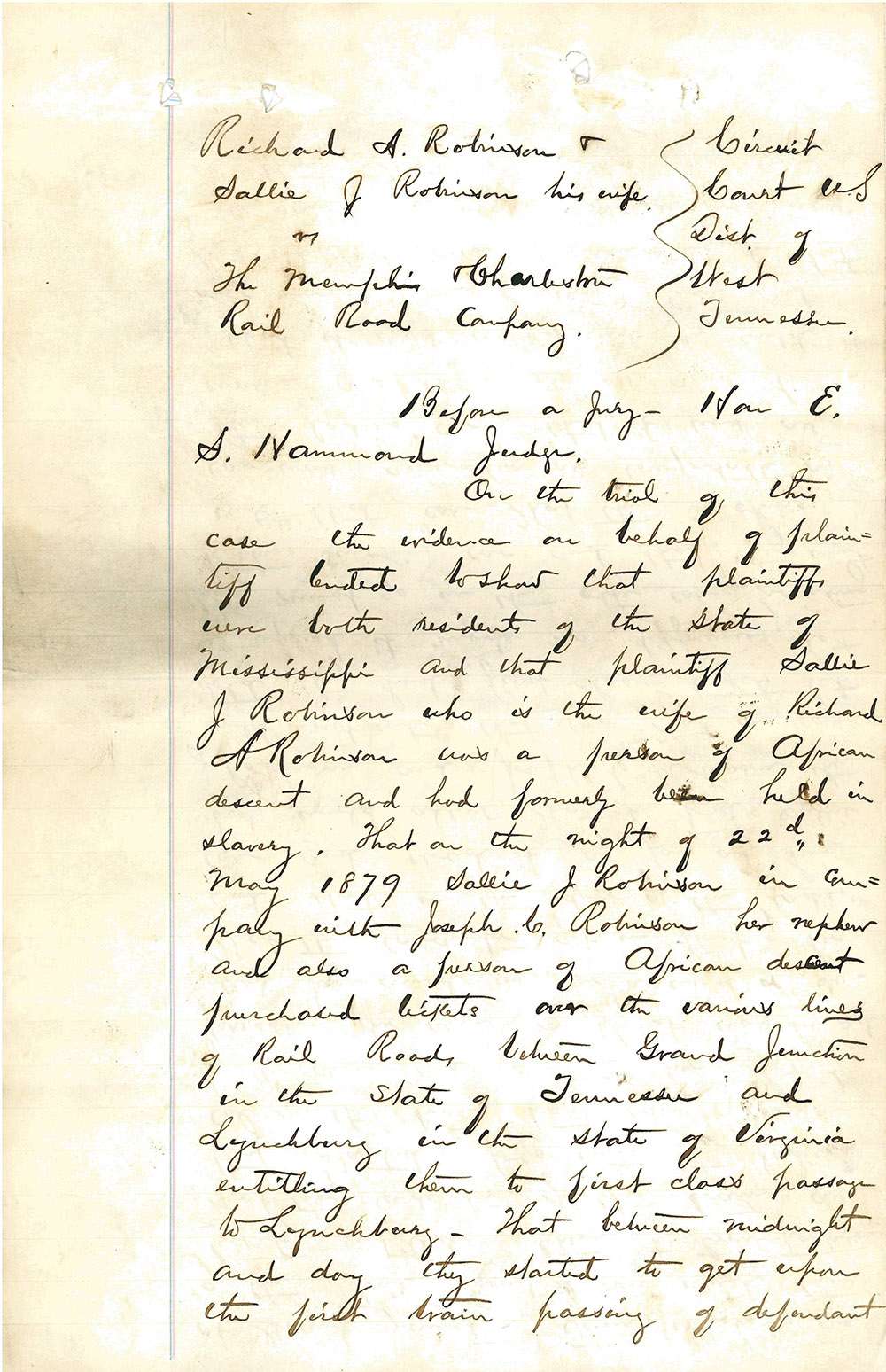
Add only page 1 to activity:
Add only page 2 to activity:
Add only page 3 to activity:
Add only page 4 to activity:
Add only page 5 to activity:
Add only page 6 to activity:
Add only page 7 to activity:
Add only page 8 to activity:
In 1875 the strongest civil rights act of the 19th century passed in Congress guaranteeing equal access to public facilities such as hotels, theatres, and railroad transportation: the Civil Rights Act of 1875.
On May 22, 1879, Sallie J. Robinson and her nephew, Joseph Robinson, purchased first class tickets to travel in the ladies’ car from Grand Junction, Tennessee, to Lynchburg, Virginia, on the Memphis and Charleston Railroad. Before boarding the ladies’ car, Sallie and Joseph were stopped by the conductor and forced to board the smoking car.
Sallie Robinson and her husband, Richard Robinson, filed a civil suit against the Memphis and Charleston Railroad for denying Sallie and Joseph accommodations on the basis of race. After a jury found for the railroad in Robinson v. Memphis and Charleston Railroad, the plaintiffs (the Robinsons) appealed to the United States Supreme Court.
The Supreme Court consolidated five cases, because of their similarity, into what became known as "the Civil Rights Cases." These were: Robinson v. Memphis and Charleston Railroad, United States v. Stanley, United States v. Ryan, United States v. Nichols, and United States v. Singleton.
The Court, with Justice Joseph P. Bradley writing for the majority, held that the Civil Rights Act of 1875 was unconstitutional because it sought to regulate individual action, which was appropriately regulated by the state police power and not by the Federal Government’s authority under the Fourteenth Amendment. The decision essentially barred Congress from passing protections, and paved the way for Jim Crow laws that codified racial segregation.
On May 22, 1879, Sallie J. Robinson and her nephew, Joseph Robinson, purchased first class tickets to travel in the ladies’ car from Grand Junction, Tennessee, to Lynchburg, Virginia, on the Memphis and Charleston Railroad. Before boarding the ladies’ car, Sallie and Joseph were stopped by the conductor and forced to board the smoking car.
Sallie Robinson and her husband, Richard Robinson, filed a civil suit against the Memphis and Charleston Railroad for denying Sallie and Joseph accommodations on the basis of race. After a jury found for the railroad in Robinson v. Memphis and Charleston Railroad, the plaintiffs (the Robinsons) appealed to the United States Supreme Court.
The Supreme Court consolidated five cases, because of their similarity, into what became known as "the Civil Rights Cases." These were: Robinson v. Memphis and Charleston Railroad, United States v. Stanley, United States v. Ryan, United States v. Nichols, and United States v. Singleton.
The Court, with Justice Joseph P. Bradley writing for the majority, held that the Civil Rights Act of 1875 was unconstitutional because it sought to regulate individual action, which was appropriately regulated by the state police power and not by the Federal Government’s authority under the Fourteenth Amendment. The decision essentially barred Congress from passing protections, and paved the way for Jim Crow laws that codified racial segregation.
Transcript
Richard A. Robinson andSally J. Robinson his wife
versus
The Memphis and Charleston Rail Road Company
Circuit Court US Dist. of West Tennessee
Before a Jury – Hon. ES Hammond Judge
On the trial of this case the evidence on behalf of plaintiff [tended?] to show that plaintiffs were both residents of the state of Mississippi and that plaintiff Sallie J. Robinson who is the wife of Richard A. Robinson was a person of African descent and had formerly been held in slavery. That on the night of 22nd of May 1879 Sallie J. Robinson in company with Joseph .C Robinson her nephew and also a person of African descent purchased tickets over the various lines of Rail Roads between Grand Junction in the state of Tennessee and Lynchburg in the state of Virginia entitling them to first-class passage to Lynchburg.
That between midnight and day they started to get upon the first train passing of defendant at Grand Junction Tennessee, it being one of the Rail Roads over which their tickets entitled them to transportation. That the conductor of the train as they started to go into the ladies’ car of the train took Mrs. Robinson by the arm and stopped her. That by pressing her arm roughly it was bruised and remained so for a week or so. That the conductor got in front of her and stood in the door of the ladies’ car and closed it as far as his body would allow. That he told Sallie J. Robinson and Joseph C. Robinson they could not enter that car. That he was told they had first-class tickets but he replied it made no difference. That they must go in the other car pointing to the smoking car and that they went into that car.
That the smoking car was generally as comfortable as the ladies’ car, that it was as warm and the seats as good but that it was dark and she could not see whether it was clean, and was used by men for smoking etc. but she saw no smoking while she was in there. That Mrs. Robinson wanted to go into the ladies’ car and did not want to go into the smoking car. That smoke made her sick. That the ladies’ car was not full.
That immediately after the train had started the conductor came back into the smoking car and examined their tickets and sat down. Joseph C. Robinson went to him to ask some question and the conductor then said to him “why do you people try to force yourselves in that car,” speaking of the ladies car. That Joseph C. Robinson replied they had first-class tickets and were entitled to ride in that car and "she is my aunt." The conductor then said they could ride in that car and could get in it at the next station and that they did go in the ladies’ car at the next station which was Salisbury, Tennessee, after riding in the smoking car for about 6 miles and for about 15 minutes.
That after going in the ladies’ car they continue to ride in it to the end of their journey. That Joseph C. Robinson and the plaintiff Sally J. stopped at Knoxville on their journey to Lynchburg to complain of their treatment to Vice President McGhee and called on Mr. Ogden the general ticket agent not finding Col. McGhee at home, and Ogden suggested that he address a letter to John A. Grant the defendant's superintendent at Memphis which he did.
The evidence on behalf of defendant was that Sallie J. Robinson was a young good-looking mulatto woman about 28 years old and that Joseph C. Robinson was a young man of light complexion, light hair and light blue eyes. That the conductor at the time of the exclusion from the ladies’ car which was at night supposed the said Joseph C Robinson to be a white man traveling with a colored woman. That the conductor had been a conductor for a long time and his experience as conductor was that when young white men traveled in company with young colored women it was for illicit purposes and that white men so traveling with colored women generally conducted themselves in an improper manner and in a manner objectionable to other passengers.
That he saw nothing objectionable in the conduct of either Joseph C Robinson or Sallie J Robinson and that his only reason for supposing her to be an improper character was that she was a good-looking colored woman traveling with what he supposed to be a young white man. (The counsel for plaintiff objected to this evidence of what the conductor supposed and to his experience because [incompetent?] and irrelevant, and no excuse or justification of the defendant. But the court overruled the objection and the defendant at the time excepted[?]
That Joseph C. Robinson and Sallie J. Robinson were excluded from the ladies’ car and directed to go into the smoking car and did so and then after the train had started the conductor went back to the car in which they were, saw their tickets and asked Joseph C. Robinson "Why did you try to take that girl into the ladies car". Robinson replied "She is my aunt and we have first-class tickets." The conductor then said “She is your aunt. Then you are colored too?" Robinson replied "Yes she is my aunt and I am a colored man." Then the conductor said "Then you can take her into the ladies’ car but wait till we stop at the first station." And they did go into the laddies’ car at the next station which was Salisbury Tennessee. That Salisbury was about 6 miles from Grand Junction and it took about 15 minutes to run that distance.
That the conductor caught hold of Mrs. Robinson's arm in stopping her but did not think he hurt her. The conductor was asked in his examination by defendant how white men traveling with colored women generally conducted themselves. He answered they generally laughed and drank and smoked and acted disorderly. (This question and answer and all the testimony as to what was generally done by white men traveling with colored women was objected to by plaintiff's counsel because incompetent[?] and irrelevant and the objection overruled. And exception taken to this action of the Court by plaintiffs.)
The conductor was asked if he had ever excluded a white woman traveling with a white man on account of suspicion as to her character. He stated he had several times and gave one instance but that the woman as he afterwards found out was really a prostitute. That he supposed Joseph C. Robinson was a young white man and that Mrs. Robinson was a colored woman and that it was not usual for young white men to travel in this country or associate with young colored women unless there were improper relations existing between them. And seeing she was a handsome young colored woman and he believing Joseph C. Robinson a young white man he suspected there were improper relations existing between them and for that reason excluded her. That the Rail Road company had given no instructions to exclude on account of color. That any lady white or colored was entitled to go into the ladies car, which was a car set apart for ladies and their escorts. And that Joseph C. and Sallie J. Robinson could have done nothing sexually[?] improper in that car without being observed but might have conducted themselves so as to be offensive to passengers. And that it was a part of the business of the conductor to see that nothing improper was done by them or the other passengers.
On cross examination the plaintiff's counsel asked the conductor "Why did you call Mrs. Robinson ‘girl’”? The conductor answered "I did not do so as a term of opprobrium but it is customary in this country to call young colored women ‘girls’ and I did it from force of habit. I do not think every colored woman wanting in virtue and I want you to understand that."
This primary source comes from the Records of District Courts of the United States.
Full Citation: Testimony from Robinson v. Memphis and Charleston Railroad Company; ca. 1879; Law Case Files, 1864 - 1938; Records of District Courts of the United States, Record Group 21; National Archives at Atlanta, Morrow, GA. [Online Version, https://docsteach.org/documents/document/testimony-robinson, April 25, 2024]Rights: Public Domain, Free of Known Copyright Restrictions. Learn more on our privacy and legal page.



